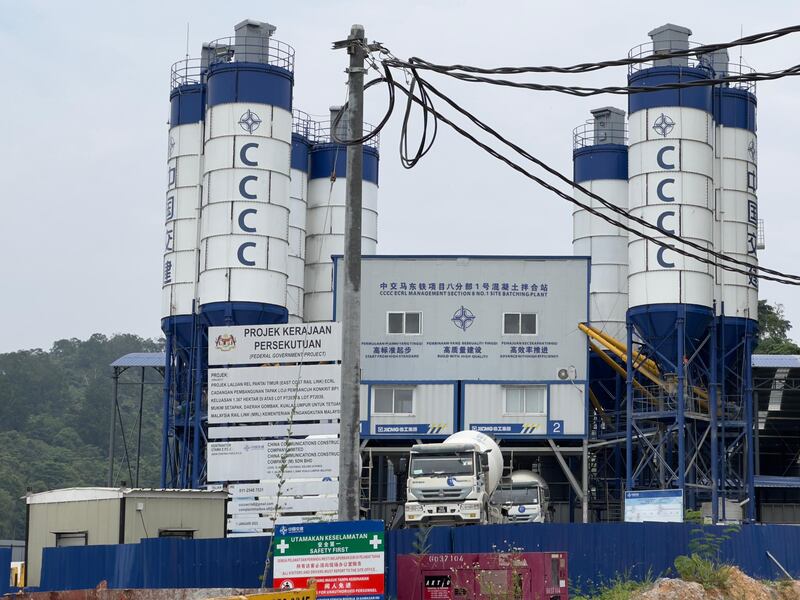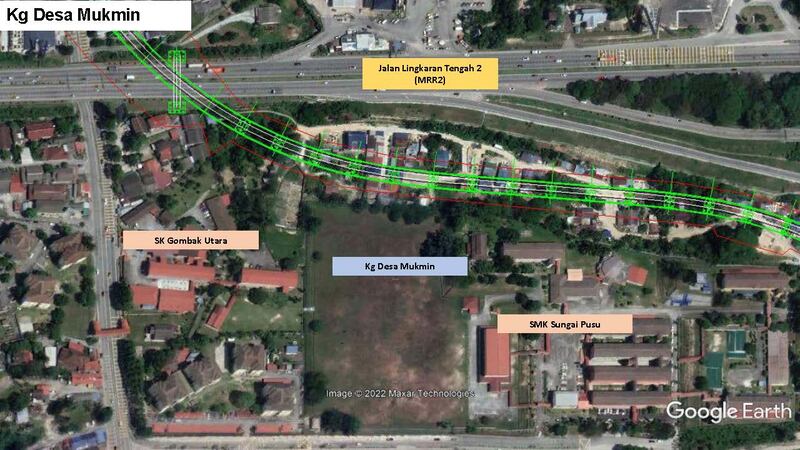Azimah and her husband scrimped and saved for years to buy their first home in Desa Mukmin Warisan, a village on the outskirts of Kuala Lumpur.
But they’ll soon have to vacate their house. In late November, the government shocked local residents when it notified them that they had only 20 days to leave, Azimah said.
Malaysia’s government plans to demolish their home and some 100 others in the village to clear land as part of a U.S. $16 billion rail project being built under Beijing’s Belt and Road Initiative (BRI).
“It truly doesn’t make sense that we are given such short notice to vacate our homes,” Azimah, 30, told BenarNews.
“They are heartless for doing this to us.”
The abrupt evictions are the latest controversy related to the East Coast Rail Link (ECRL), a China-backed project bogged down by delays, cost overruns and allegations of corruption since it broke ground in 2017.
The manner in which the residents have been treated, analysts said, highlights the gaps in communication and engagement on how mega-projects are handled in Malaysia, particularly those under the BRI. The initiative is Beijing’s ambitious plan to build a network of global infrastructure and supply chains that would connect China to the rest of the world.
“The lack of transparency and public engagement is rooted in the way the government treats these megaprojects – as huge acts of benevolence, by promising massive developments in rural Malaysia that will greatly benefit all,” Benjamin Loh, a senior lecturer in media studies at Taylor’s University in Subang Jaya, Selangor, told BenarNews.
“They serve as federal political selling points and everything in between is considered not in the public interest,” said Loh, who in June published a research paper for Malaysia’s Institute for Democracy and Economic Affairs on BRI projects and engagements with local communities where these projects are being built.
Loh said the process of displacing people to make way for a project should be made more transparent.
“[H]ow they determine the amount being reimbursed, or justify the need for them to be relocated. This is why social impact assessments are so important,” Loh said.

Beijing-backed projects are particularly controversial – they are delayed, face graft allegations and accusations of opacity – because they get enmeshed in local politics, critics said.
In recent years, China’s stringent controls on capital outflow have made it difficult for the country to fully fund via loans BRI projects it initially promised to back, said Oh Ei Sun, an analyst at Singapore’s Institute of International Affairs.
“Direct negotiation and design-and-build projects typically would need some forms of [local] political backups, so it is only natural that politics are involved,” Oh told BenarNews.
Political involvement often means a lack of transparency as happened in Azimah’s village where a section of the railway is being built, said Sri Murniati Yusuf, chief operating officer of the Institute for Democracy and Economic Affairs, which promotes solutions for public policy challenges.
“It is a matter of improving the governance when it comes to this,” Sri told BenarNews.
The 655-km (414-mile) rail project, which will span the states of Selangor, Pahang, Terengganu and Kelantan, was launched in August 2017.
The project was shelved in 2018 due to corruption allegations, but revived in 2019 with modifications and a cost reduction of 11 billion ringgit (U.S $2.37 billion), Prime Minister Anwar announced last December.
Malaysian Transport Minister Anthony Loke told Parliament in September that the ECRL project was nearly 54% done and well-positioned for completion by 2027.
‘We will install a barricade’
On Nov. 25, a BenarNews correspondent paid a return visit to the village in Gombak, which is a town in Selangor state, and attended the meeting during which residents were first informed that they would be evicted and have to vacate their homes by Dec. 15 to make way for ECRL project planning.
Officers from Selangor’s Department of the Director General of Lands and Mines (Federal) and a spokesperson from the contractor and builder, China Communications Construction (ECRL) Co., were also present at the meeting and declined to answer BenarNews questions on the short notice period for residents’ eviction. The department’s role is to carry out the land acquisition process for federal projects.
BenarNews also reached out for comment to the office of the chief minister for Selangor state by phone and email, but did not receive a response.
The collective stance of the Desa Mukmin Warisan villagers – the rail section will be built on top of where the village now exists – is that they will refuse to move.
Former chair of the Desa Mukmin Warisan Residents’ Committee, Mohd. Najib Mokhtar, said members of the community would not budge an inch and would fight for their rights.
“Now, before any heavy machinery enters our village and destroys our homes, we will install a barricade and request police assistance in this,” he told BenarNews.
“We just hope that our chief minister and Prime Minister Anwar Ibrahim will hear our appeal on this issue because we don’t have anywhere else to go,” he said.

‘Strategic for Beijing’s long-term interests’
Meanwhile, one political analyst indicated that all this upheaval was occurring for a project that would benefit Beijing’s ambitions greatly.
It wouldn’t give Malaysia healthy economic returns either, said the analyst, Collins Chong Yew Keat, from the University of Malaya.
“The ECRL’s cost benefit calculations have not been convincing and consistent in long-term best returns for the country [Malaysia], especially given the high costs both in [terms of financial drain] and in the potential implications in the geopolitical and security spheres,” he told BenarNews.
Former Transport Minister We Wee Ka Siong disagreed.
“The benefit that the ECRL project can generate is … the rapid economic development in the East Coast states when rail facilities are provided and the cost of cargo transportation from and to the East Coast is reduced by 40% - 50%,” he wrote on his Facebook page in May.
“This will increase the competitiveness of the East Coast states and create more new industries that are expected to generate income through taxes to the Government and then returned to the people.”
However, the East Coast of Peninsular Malaysia is of “strategic for Beijing’s long term interests,” both in serving the cause of its South China Sea ambitions and its Taiwan agenda, analyst Collins Chong said.
“It accelerates future security calculations in complementing the Kunming-Kuala Lumpur railway project,” he said.
“[And] this will serve as the final missing piece in connecting the South China Sea through land routes, [as well as] connecting the ECRL with the future railway all the way to mainland China.”
